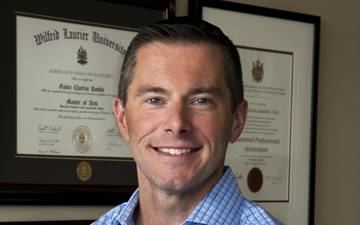
Embracing Employee Entrepreneurs

Gavin Rouble of the 2% Factor on how leaders can sculpt a great workplace culture from a new generation
LEADERS are like sculptors. They have an image in their mind of the culture they wish to create. Employees are the materials by which they may or may not fulfil their vision.
The dilemma faced by many accounting and finance leaders today is those materials often comprise a new generation of young, intelligent workers who behave very differently from previous cultural norms.
I call this new generation of worker the Employee Entrepreneur.
They have earned the label because, just like entrepreneurs, they naturally disrupt traditional ways of business. They have been raised to question everyone, examine everything and never blindly accept a “truth.”
They see the world as entrepreneurs do — by meeting needs or accomplishing goals in ways that are faster, better and more efficient than previously practised.
Some managers are threatened or feel disrespected by this behaviour. But effective leaders can adapt, relate to and lead these employees.
In fact, by following three simple steps, savvy leaders can learn to embrace today’s Employee Entrepreneurs, and leverage their creativity and innovation.
1. Guidance, not constraint, is key.
The value delivered by Employee Entrepreneurs lies in their ability to develop solutions not constrained by the limitations that hamper industry incumbents.
They require guidance to offset their lack of experience but should never have limitations placed upon them. The only reasons to outright say no to their suggested solutions to an identified problem should be:
- It breaks a law.
- It breaches company policy.
- It is potentially damaging to the company’s brand.
- It is unethical and could damage the public’s perspective of the profession.
- It could harm, physically or otherwise, someone else.
If any of these criteria are not breached, however, why not give their approach a try?
2. Mistakes must be made.
Most employees learn to be afraid of making mistakes. Making a mistake could mean the loss of a bonus, demotion or even termination.
Yet, at the very core of entrepreneurial behaviour is the notion of doing something that hasn’t been done before. In these situations, the only way to determine if an innovative idea put forth by an Employee Entrepreneur will work is through trial and error.
That’s error, as in making mistakes.
So, on the one hand, these employees must be free to make mistakes to determine if their approach is valid and indeed better. However, on the other hand, if they make these mistakes, they are under threat of being fired.
See the problem?
To truly embrace these new Employee Entrepreneurs, leaders must adjust their approach to employee performance assessment by incorporating a process or policy that allows for reasonable mistakes to be made.
This can be successfully executed by creating strategies that allow for ideas to be tested, and mistakes made, without risking current operational processes.
##professional-mastery-program##
3. ”Best Practices” are not always best.
Employee Entrepreneurs are not big fans of what are commonly referred to as “best practices.”
To them, there is no such thing as a “best” practice because there is always a better way. Managers who cling to best practices like a security blanket will naturally be at odds with this new type of employee.
Yet this doesn’t have to be.
A best practice represents a “once upon a time” innovative approach that yielded superior results over and over again. As more people recognized the value of this approach and adopted it, it became widely accepted as the “best” approach or practice.
So, today’s best practice is yesterday’s innovative approach.
This means that tomorrow’s best practice will be based on today’s innovation. Who better to plan and execute that innovation than the Employee Entrepreneur?
Being given the opportunity to contribute in a material way and being allowed to be creative and innovative at the same time is a dream come true for Employee Entrepreneurs. It signals to them that that their input and ideas are respected, and their skills and knowledge are trusted.
Respect and trust. Innovation and results.
Sounds like a workplace culture sculpted through the vision of a true leader.
Gavin Rouble MA, CPA, CMA, is an author, former CFO, and co-founder of The 2% Factor, pioneering an uncommon common sense approach to creating amazing workplace relationships. Gavin can be reached at gavin@the2percentfactor.com.





(0) Comments